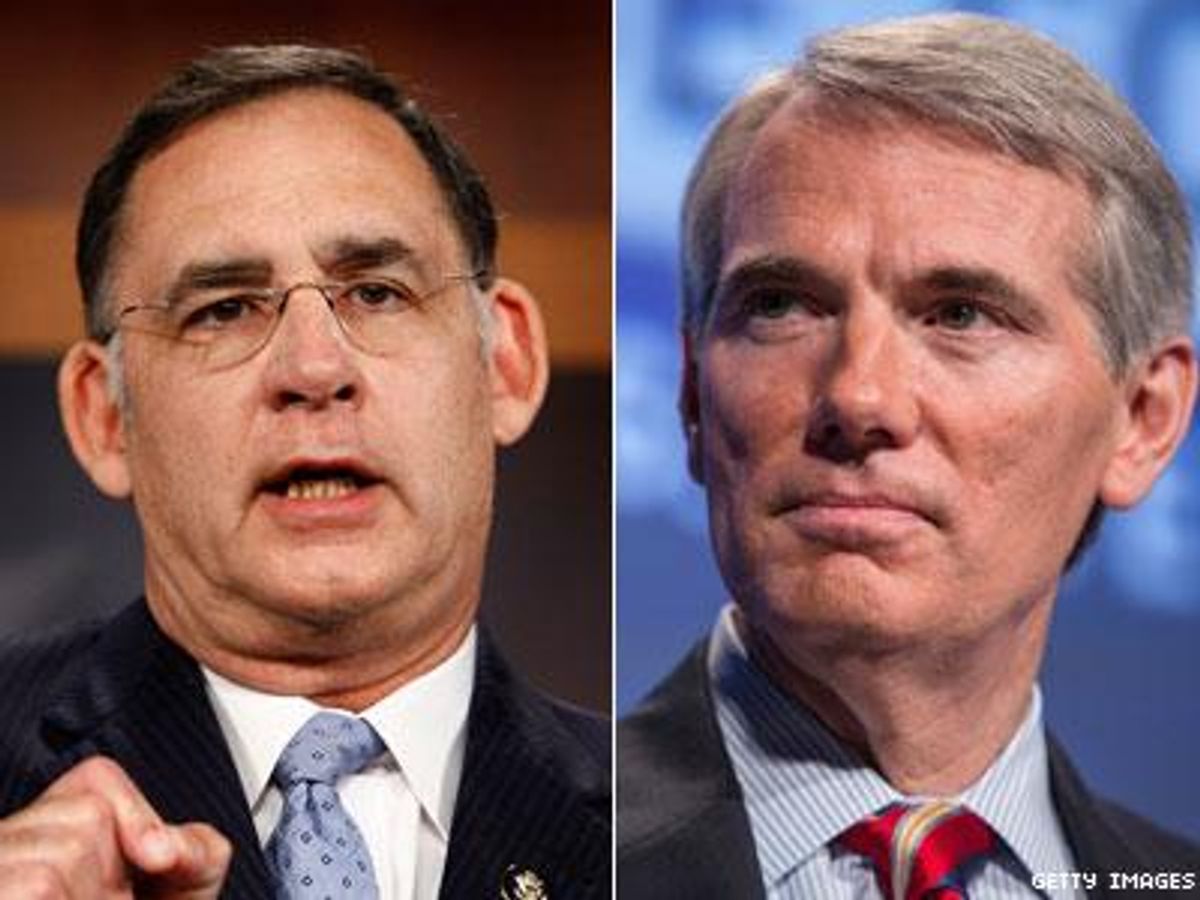 Normally Republican arguments against equal rights for LGBT Americans are based in fantasy land. The GOP platform actually says marriage equality is "an assault on the foundations of our society," as if we risk going the way of ancient Rome.
Normally Republican arguments against equal rights for LGBT Americans are based in fantasy land. The GOP platform actually says marriage equality is "an assault on the foundations of our society," as if we risk going the way of ancient Rome.
Televangelist Pat Robertson, a Republican who once ran for president, is among those who say same-sex love causes earthquakes and hurricanes. It's hard to argue with that.
But when it comes to the Employment Non-Discrimination Act, Republicans have more reality-based concerns. And maybe that's why activists say there are 60 votes in the Senate to break a filibuster and pass the law. These concerns can actually be assuaged.
What Republican Sen. John Boozman of Arkansas recently toldThe Huffington Post exemplifies a big concern of theirs about ENDA's impact on businesses. "There is so much burden," he said, "it opens them up to lawsuits."
In an oft-repeated talking point against ENDA (made even by Sen. Rob Portman of Ohio who supports marriage equality), some Republicans warn it will lead to lawsuits. My reaction is always, um, yes, it will.
When a school teacher gets fired because it's discovered she has a female partner, or a cashier is told that being gay doesn't reflect a business' public image, then they should sue. That's the point of ENDA.
The problem is suing is only possible in the 21 states that have gone further than the federal government and adopted their own versions of ENDA (some of which don't ban discrimination against transgender employees). In the rest of the states, if a man is fired for spending his lunch hour with his boyfriend, he is out of luck.
All this consternation about lawsuits, though, is maybe much ado about nothing. The nice thing about states being treated as the laboratories where the federal government gives new laws a try is that we have a sense of whether our worst fears will come true.
Researchers have already analyzed the number of complaints made in those states with some form of ENDA and found that LGBT people were no more likely to file a grievance over workplace discrimination than other minority groups. So there is no avalanche of litigation awaiting passage of ENDA. Here's how The Williams Institute's Lee Badgett explained that finding in written testimony before the Senate's HELP Committee back in 2012:
"My colleagues and I collected the numbers of sexual orientation discrimination complaints in states that outlawed such treatment from 1999-2007. The number of complaints in each state is relatively small compared with the overall level of complaints filed at state agencies. But once we adjust for the population size of the different protected groups, we see that LGB people are as likely to file complaints as women and people of color. The annual rate of complaints was 4.7 per 10,000 LGB people on average in these states (assuming that LGB people are 4.1% of the U.S. population). That figure is quite similar to the number of sex discrimination complaints per woman (5.4 per 10,000 women) and race-related complaints per person of color (6.5 per 10,000). In other words, LGB people are about as likely to file discrimination complaints as are people in groups that are currently protected against discrimination under federal law."
The bottom-line is that yes, there will be lawsuits. Not that many. I like how Tico Almedia, founder of Freedom to Work, phrases it: "There will be more than zero lawsuits."
But Almedia notes that suing isn't the only point of ENDA. That isn't even the law's primary benefit to LGBT Americans. The other effect will be that lawyers all over the country "are going to begin a period of very intense counseling of their clients who are employers." These employers will learn it's no longer OK to discriminate against LGBT employees, and their human resources departments will start making changes. At the very least, they'll ensure all managers and employees hear about antigay discrimination during those training sessions we all have to attend.
ENDA's real value is in prevention. It stops problems before they happen, rather than creating a flood of lawsuits.
And, isn't the "risk" to courtroom dockets worth taking? The only other option is to follow the lead of Republican Rep. Steve King of Iowa who suggests that LGBT employees stay closeted while at work. "If you don't know anybody's sexuality, you can't discriminate against them," he toldThink Progress in 2012.
Democrats can't pass ENDA on their own. In both the Senate and the House, votes of Republicans are mandatory. So let's hope the lawmakers who are based in reality will look at the research, or that they'll listen to people like Republican Sen. Susan Collins.
"The right to work is a fundamental one. How can we in good conscience deny that right to someone for no other reason than their sexual orientation or gender identity?" the senator from Maine said in a statement ahead of the bill being passed out of a Senate committee this month. "Especially in today's economy, job security has taken on a renewed importance to all Americans. How can we tell one segment of Americans that they are not entitled to that security because of whom they love?"
LUCAS GRINDLEY is editorial director for Here Media. He lives in Los Angeles with his husband and two foster children. Contact him on Twitter @lucasgrindley.


 Normally Republican arguments against equal rights for LGBT Americans are based in fantasy land. The GOP platform
Normally Republican arguments against equal rights for LGBT Americans are based in fantasy land. The GOP platform 















































































